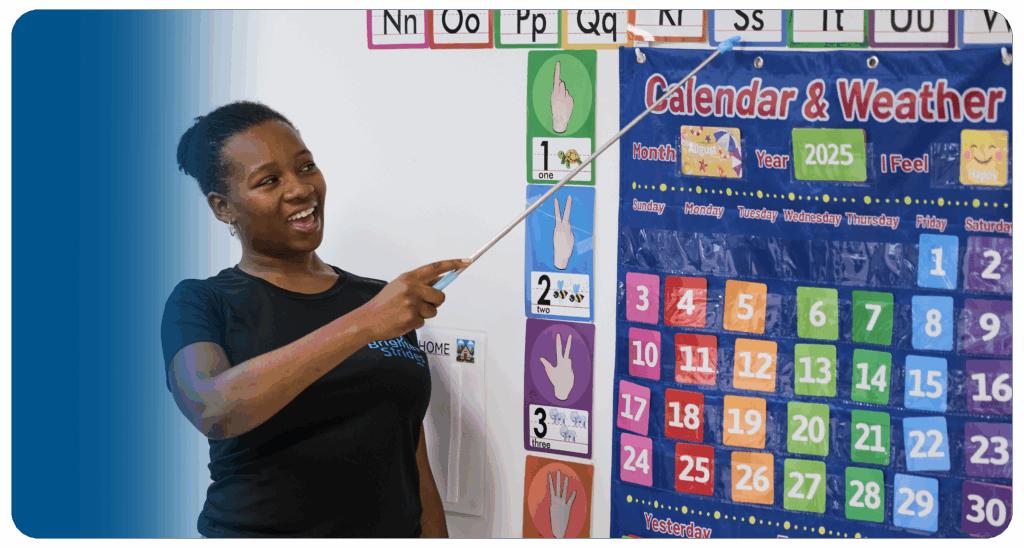Understanding RBT Certification
Before delving into the timeline for RBT certification, it’s important to have a clear understanding of what RBT certification entails and why it is significant.

What is RBT Certification?
RBT Certification, which stands for Registered Behavior Technician, is a credential awarded by the Behavior Analyst Certification Board (BACB) to individuals who meet specific requirements and demonstrate competence in the field of behavior analysis. The BACB is responsible for setting the standards and providing certification for professionals in behavior analysis.
As an RBT, individuals work under the supervision of a Board Certified Behavior Analyst (BCBA) or Board Certified Assistant Behavior Analyst (BCaBA) to implement behavior reduction and skill acquisition programs with individuals who have autism or other developmental disabilities. RBTs play a crucial role in providing direct services and assisting in the assessment and treatment of challenging behaviors.
Importance of RBT Certification
Obtaining RBT certification is essential for individuals who wish to pursue a career in behavior analysis and work directly with individuals with autism or other developmental disabilities. Here are a few reasons why RBT certification is important:
- Standardization: RBT certification ensures that professionals in the field of behavior analysis meet a consistent set of standards and possess the necessary skills and knowledge to provide effective interventions.
- Quality of Services: RBTs are trained in evidence-based practices and techniques that have been shown to be effective in improving behavior and skill development. With their certification, RBTs can contribute to providing high-quality services to individuals and their families.
- Professional Growth: RBT certification serves as a stepping stone for individuals who wish to advance their careers in behavior analysis. It provides a foundation for further professional development and opportunities to pursue higher levels of certification, such as becoming a BCBA or BCaBA.
- Employment Opportunities: Many employers in the field of behavior analysis require or prefer RBT certification when hiring individuals to work as behavior technicians. Holding this certification can enhance job prospects and open doors to various employment settings, such as schools, clinics, and residential facilities.
Understanding the nature and significance of RBT certification sets the stage for exploring the timeline and process involved in obtaining this valuable credential.
RBT Certification Process
To become a Registered Behavior Technician (RBT), individuals must go through a specific certification process that includes training, competency assessment, and application. Let’s explore each step in detail.
Training for RBT Certification
The first step towards RBT certification is completing a 40-hour training program. This training program covers the required content areas outlined by the Behavior Analyst Certification Board (BACB) (MasterABA). The training program provides individuals with essential knowledge and skills in areas such as measurement, assessment, skill acquisition, behavior reduction, documentation, and professional conduct.
Competency Assessment for RBT Certification
After completing the 40-hour training program, RBT candidates must pass a competency assessment. This assessment is conducted by a qualified Board Certified Behavior Analyst (BCBA) supervisor and aims to evaluate the candidate’s ability to deliver behavior-analytic services effectively. The competency assessment ensures that candidates have acquired the necessary skills to work with individuals requiring behavior-analytic interventions.
Application and Approval Process
Once the competency assessment is successfully passed, RBT candidates can proceed with the application for certification. The application process involves submitting an application, paying an application fee, and agreeing to the RBT Code of Ethics (BACB). It is important to complete the application accurately and provide all required documentation to avoid any delays in the certification process.
The Behavior Analyst Certification Board (BACB) typically takes 4-6 weeks to process RBT certification applications and issue the certification upon approval (MasterABA). It is essential to allow sufficient time for the processing of the application and to ensure all requirements are met.
By following the RBT certification process, individuals can acquire the necessary training, demonstrate their competency, and apply for certification to become a Registered Behavior Technician. The certification signifies a commitment to delivering high-quality behavior-analytic services and opens up opportunities for career advancement in various settings.
Timeline for RBT Certification
When considering the timeline for RBT (Registered Behavior Technician) certification, it’s important to note that the duration can vary based on individual circumstances and factors. However, we can provide a general overview of the typical duration and the factors that may affect the RBT certification timeline.
Typical Duration for RBT Certification
The RBT certification process typically takes around 6-8 weeks from start to finish, including the initial training, competency assessment, and application submission. According to the Behavior Analyst Certification Board (BACB), the process usually takes 4-6 weeks from the time the application is submitted to receiving the certification (BACB).
However, it’s important to note that the timeline can vary depending on factors such as an individual’s pace, availability, and the specific requirements of the training program. Some sources mention a broader timeline of 3-6 months to become an RBT. The average completion time is reported to be around 4.5 months.
Factors Affecting RBT Certification Timeline
Several factors can influence the timeline for RBT certification:
- Individual Pace and Availability: The time it takes to complete the certification process can vary depending on an individual’s commitment, study time, and availability to complete the required training and assessments.
- Supervision and Fieldwork: RBT candidates must complete a minimum of 40 hours of supervised training and fieldwork. The availability of a qualified supervisor and scheduling the necessary supervision hours can impact the overall timeline.
- Application Processing: The initial application for RBT certification may take up to 30 days to be processed and approved. This processing time should be considered when estimating the overall timeline.
- Additional Requirements: In addition to the initial application and assessment, RBT candidates must complete other requirements, such as the 40-hour training, competency assessment, and continuing education. The time needed to fulfill these additional requirements can affect the overall duration.
- External Factors: Delays in finding a qualified supervisor or gaining the necessary experience hours can also impact the timeline for RBT certification.
By understanding the typical timeframe for RBT certification and considering the factors that may affect the timeline, individuals can better plan their journey toward becoming a Registered Behavior Technician. It’s important to stay organized, seek support from experienced professionals, and follow the guidelines provided by the relevant certification board to ensure a smooth and efficient certification process.
Maintaining RBT Certification
Obtaining RBT (Registered Behavior Technician) certification is an important step towards a rewarding career in applied behavior analysis. However, maintaining this certification requires regular renewal and fulfillment of continuing education requirements. Let’s explore the process of renewing RBT certification and the continuing education requirements for RBTs.
Renewal Process for RBT Certification
RBT certification is valid for one year, and individuals must complete a renewal process to maintain their certification. The renewal process includes submitting a renewal application and paying a renewal fee. As of the time of writing, the renewal fee for RBT certification is $35 (Cross River Therapy). It’s important to note that the renewal fee is subject to change, so it is advisable to check the most up-to-date information from the appropriate sources.
To ensure a seamless renewal process, RBTs should submit their renewal application prior to the expiration date of their current certification. This helps avoid any gaps in certification status. It’s essential to keep track of the expiration date and plan accordingly to meet the renewal requirements in a timely manner.
Continuing Education Requirements for RBTs
Continuing education is an integral part of maintaining RBT certification. RBTs are required to fulfill continuing education requirements on an annual basis to stay updated with the evolving practices and advancements in the field of applied behavior analysis (Central Reach). These requirements help ensure that RBTs maintain their competence and provide the highest quality care to their clients.
As of the time of writing, the Behavior Analyst Certification Board (BACB), which oversees the RBT certification, mandates that RBTs complete a minimum of 20 hours of continuing education each year. The specific requirements for continuing education may vary, so it is important to consult the BACB guidelines and other reliable sources for the most up-to-date information.
Continuing education activities can include workshops, seminars, conferences, webinars, online courses, and other educational opportunities relevant to the field of applied behavior analysis. RBTs should ensure that the continuing education activities they choose are approved by the BACB or other recognized organizations.
By fulfilling the renewal process and continuing education requirements, RBTs can maintain their certification and stay up-to-date with the latest developments in the field. This commitment to ongoing learning and professional growth contributes to the overall quality of care provided by RBTs and ensures that they remain valuable members of the applied behavior analysis community.
Opportunities with RBT Certification
Becoming a Registered Behavior Technician (RBT) opens up a range of employment opportunities in various settings. The RBT certification is recognized internationally and is highly valued in the field of applied behavior analysis (ABA). Let’s explore the employment settings for RBTs and the international recognition of RBT certification.
Employment Settings for RBTs
RBTs play a crucial role in providing direct therapy to individuals with autism and implementing behavior intervention plans designed by Board Certified Behavior Analysts (BCBAs) or Board Certified Assistant Behavior Analysts (BCaBAs). With RBT certification, you can find employment opportunities in various settings, including:
- Schools: RBTs may work in public or private schools, supporting students with autism or other developmental disabilities in classroom settings. They collaborate with teachers and other professionals to implement behavior strategies and promote positive learning outcomes.
- Clinics and Therapy Centers: Many clinics and therapy centers specialize in providing ABA therapy to individuals with autism. RBTs can work in these settings, delivering one-on-one therapy sessions and helping clients develop essential skills.
- Private Homes: Some families hire RBTs to provide in-home therapy for their children with autism. In this setting, RBTs work closely with families, implementing behavior plans, and promoting skill development within the home environment.
- Community Programs: RBTs can also work in community-based programs that provide support and intervention for individuals with autism. These programs may include social skills groups, recreational activities, and community integration.
International Recognition of RBT Certification
The RBT certification has gained international recognition, opening doors to employment opportunities beyond national borders. The skills and knowledge acquired through RBT training are valued globally, allowing RBTs to explore job prospects in various countries.
The Behavior Analyst Certification Board (BACB), the organization responsible for RBT certification, ensures that the RBT credential meets international standards. This recognition allows RBTs to transfer their skills and expertise to different settings worldwide.
By obtaining RBT certification, you can demonstrate your commitment to providing quality ABA services and enhance your employability not only within your local community but also on a global scale.
The opportunities for RBTs are diverse, and the demand for qualified professionals in the field of ABA continues to grow. Whether you choose to work in schools, clinics, private homes, or community programs, the RBT certification equips you with the necessary skills to make a positive impact on the lives of individuals with autism.
RBT Certification Requirements
To become a Registered Behavior Technician (RBT), individuals must meet specific requirements set forth by the Behavior Analyst Certification Board (BACB). These requirements include minimum age and education qualifications, completion of training and supervision hours, as well as passing the RBT certification exam.
Minimum Age and Education Requirements
To qualify for RBT training and certification, individuals must meet the following criteria:
- Minimum Age: Candidates must be at least 18 years old to pursue RBT certification.
- Education: A high school diploma or equivalent (GED) is required to begin the certification process.
Training and Supervision Hours for RBTs
The RBT certification process involves completing a 40-hour training program that covers the principles of behavior analysis, ethics, and specific skills required for working with individuals with autism. This training is typically completed under the supervision of a certified Applied Behavior Analysis (ABA) therapist.
The training consists of 30 hours of content-specific training and an additional 10 hours of supervision (BACB). The supervision hours are necessary to ensure that candidates gain practical experience and mastery of the skills outlined in the RBT Task List provided by the BACB.
RBT Exam and Certification Registry
After completing the required training and supervision hours, individuals must pass the RBT certification exam. The exam assesses the candidate’s knowledge and competency in the field of behavior analysis. The duration of exam preparation can vary, but it generally takes around 1 to 2 months to adequately prepare for the exam.
Upon successful completion of the exam, individuals are officially granted RBT certification. The BACB provides an official RBT certification registry where individuals can search for certified RBTs by name, location, or other criteria (BACB).
Meeting these requirements is essential to obtaining RBT certification and embarking on a rewarding career in the field of Applied Behavior Analysis. It is important to note that the timeline for completing these requirements may vary depending on individual circumstances and the availability of training programs and supervision opportunities.
Conclusion
In conclusion, becoming a Registered Behavior Technician (RBT) requires a significant commitment of time, effort, and dedication. It involves completing a 40-hour training program, passing the certification exam, and fulfilling ongoing continuing education requirements.
However, the benefits of obtaining RBT certification are numerous. RBTs play an essential role in providing direct therapy to individuals with autism and developmental disabilities. They assist Board Certified Behavior Analysts (BCBAs) or Board Certified Assistant Behavior Analysts (BCaBAs) in implementing behavior intervention plans and promoting positive learning outcomes.
Moreover, the RBT certification is recognized internationally and opens up diverse employment opportunities in various settings such as schools, clinics, private homes, and community programs. The demand for qualified professionals in the field of ABA continues to grow globally.
By obtaining RBT certification, individuals can demonstrate their commitment to providing quality ABA services and enhance their employability within their local communities as well as on a global scale. Therefore, pursuing RBT certification can be a rewarding step towards building a successful career in applied behavior analysis while making a positive impact on the lives of individuals with autism.
Sources
- https://www.bacb.com/
- https://www.crossrivertherapy.com/rbt/how-long-to-become-an-rbt
- https://centralreach.com/rbt-certification/
- https://www.appliedbehavioranalysisedu.org/rbt-certification/




